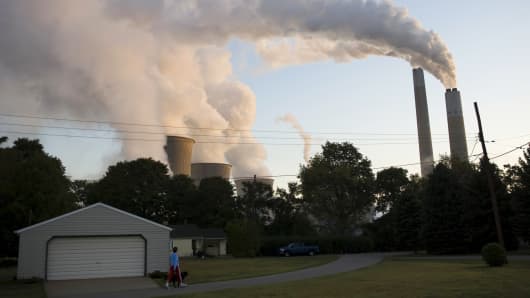Tax reform is hot this year, and rightly so. Mending an outdated tax system is an important political and policy objective. I am optimistic that Republican lawmakers will be successful, but no matter the scale or scope of this effort, it will not be the last big tax bill. Because tax reform is a perpetual effort, it is not too early to start considering post-tax-reform tax reform ideas.
One worthy candidate for the next tax reform effort is a cut in the most distortionary taxes in exchange for a tax on carbon emissions, combined with permanent carbon deregulation of the energy sector. Such a reform package – conservative in design – has the potential to boost U.S. economic growth in the long run.
In conservative policy circles, a carbon tax is controversial at best. But conservative voters – and groups that Republicans would like to see vote conservative – are increasingly interested in policies to mitigate the real risk of climate change. More importantly, pro-growth fiscal reforms will be critical for the well-being of future generations. With these realities in mind, here are the three key components of a deregulatory carbon tax reform:
- Roll back burdensome carbon-related regulations. As conservatives well know, command-and-control regulations can be inefficient and restrain our economy. Many existing regulations aimed at reducing carbon emissions are textbook examples of this.There should be a definitive legislative rollback of these regulations for the simple reason that they do not work well. The motivation is not disregard for the environment or climate, but distrust in the regulatory state as an efficient instrument.
- Let a carbon tax do well what regulations do poorly. A transparent carbon tax would reduce emissions in a more efficient manner than any strategy developed by bureaucrats in Washington. Consumers would respond to a uniform price on carbon emissions by using less energy, and producers by developing technologies to reduce the carbon intensity of the energy that is consumed. Undeniably, a carbon tax would raise the price of certain consumer goods, including electricity and gasoline. That is a reality that should not be denied, or avoided. It is, in fact, the policy's intent. The tax on these goods would make explicit a cost otherwise not recognized.
- Finance a large, pro-growth tax cut. In addition to achieving a market-driven reduction in emissions, a carbon tax would generate revenue that could be used to offset the cost of eliminating other taxes that impose greater harm on the economy. Deciding which taxes to cut or eliminate will depend in part on the success of the current tax reform effort, but there is mounting evidence that a reduction in the corporate income tax would have a meaningful impact on capital stock and ultimately on workers' wages. Turning carbon tax revenues into universal welfare payments, as some have suggested, would not promote long-run economic growth.
Traditionally, conservatives abhor any new tax out of fear that new sources of revenue will increase the size of government. Some also believe that a carbon tax is a solution in search of a problem. I believe that the popularity of these objections is fading. In addition to the growing number of young voters who want lawmakers to be more engaged in environmental stewardship, there is a growing recognition that our country's long-run fiscal imbalance requires pro-growth reforms that do not worsen the deficit.
In support of these trends, conservative leaders from policy, academic, business, and political spheres recently launched the Alliance for Market Solutions (AMS) to promote dialogue on the benefits of a revenue-neutral carbon tax paired with a regulatory rollback.
To start, AMS published Carbon Tax Policy: A Conservative Dialogue on Pro-Growth Opportunities, a book intended for conservative readers willing to consider the trade-offs, design choices, and opportunities of such a reform.
Some of the domestic challenges our country will face in the coming years are explicitly off the table. This may include carbon pollution, if the President's recent decision to withdraw from the Paris Agreement is any indication. But ultimately these challenges must be addressed. Conservatives should work to ensure that the eventual solutions are market-based strategies to encourage consumers and innovators alike to pursue socially optimal outcomes.
Commentary by Alex Brill, a research fellow at the American Enterprise Institute and the editor of the new book Carbon Tax Policy: A Conservative Dialogue on Pro-Growth Opportunities. Follow him on Twitter @ AlexBrill_DC.
For more insight from CNBC contributors, follow @CNBCopinion onTwitter.


